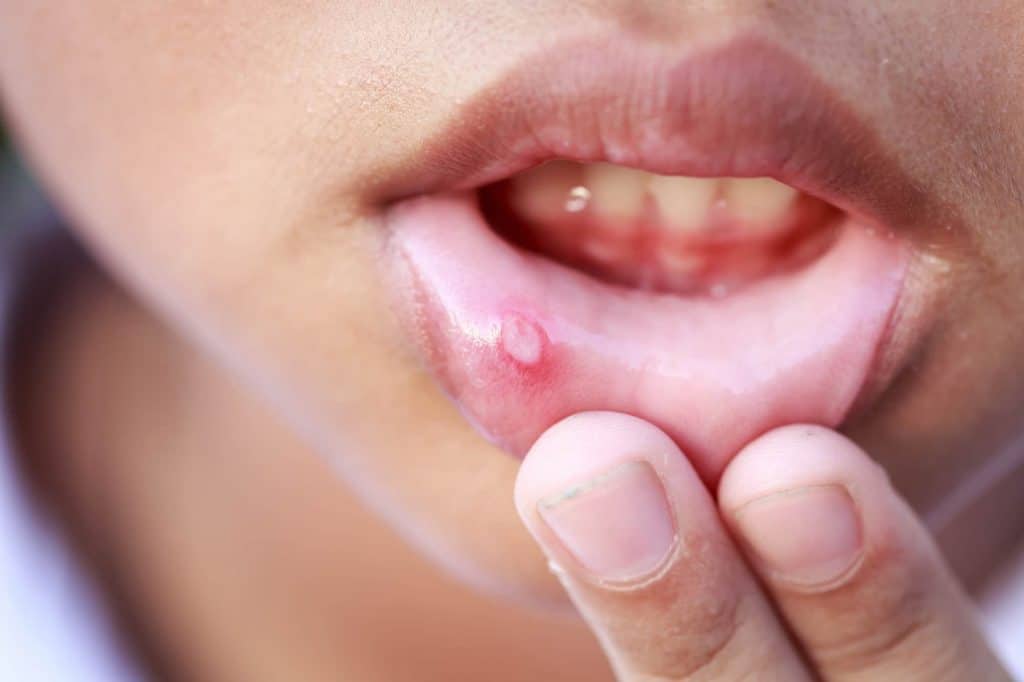Canker sores are small, non-contagious ulcers that develop inside your mouth. You may find them on your tongue, gums or lips. Although canker sores don’t typically cause any serious health concerns, they can cause a lot of discomfort. If you think you have canker sores, then you will want to learn more about the condition so you can treat it and delay your next outbreak.
Potential Causes of Canker Sores
Doctors don’t know the precise reasons why some people get canker sores, but they have discovered several triggers that can increase your chances of getting them. Some of the most common triggers include:
- Emotional stress
- Hormonal changes (especially during menstruation)
- Allergies
- Food sensitivities
- Sodium lauryl sulfate, an ingredient in many toothpastes
- Aggressive brushing
- A diet that deprives you of B-12, iron, zinc or folic acid
Doctors have also noticed that some diseases put people at higher risk of getting canker sores. You may develop canker sores more frequently if you have:
- Celiac disease
- Crohn’s disease, ulcerative colitis or other inflammatory bowel diseases
- Behcet’s disease
- HIV/AIDS
It’s important to recognize that canker sores are not the same as cold sores. You cannot transfer canker sores to other people, even through direct contact. Cold sores, however, are contagious.
Common Symptoms of Canker Sores
If you have a canker sore, you may notice a slight stinging, burning or itching sensation in your mouth. Eating salty or acid foods can make the pain more intense.
When looking for canker sores, search for small, white spots with red edges. Major canker sores can cover larger areas and cause extreme pain. Most people, however, only experience minor, pinpoint-sized sores. Some canker sores develop in clusters of 10 to 100.
How to Treat and Prevent Canker Sores
Most canker sores will heal in about two weeks even if you don’t treat them. During that time, you can manage the pain by taking an over-the-counter analgesic or applying a canker sore gel that will numb the pain.
If you have canker sores often, then you should follow some preventative guidelines to prevent future outbreaks. You may find that you can prevent or reduce the frequency of canker sores by:
- Avoiding acidic and spicy foods
- Using a soft toothbrush
- Eating a healthful diet that includes plenty of fruits and vegetables
- Managing stress through exercise, meditation or other methods
When to See Your Dentist About Canker Sores
Canker sores rarely require treatment from a dentist. You should, however, visit your dentist if you have:
- Unusually large sores
- Sores that persist for three weeks or longer
- A high fever
- Intense pain that interferes with your life
- Sores that spread to other parts of the mouth
When you see your dentist, he or she will diagnose the condition to make sure you have canker sores instead of more troublesome ulcers. Assuming that you have canker sores, you will receive a soft tissue laser treatment that reduces pain quickly and encourages the sores to heal. You can expect the sores to heal within a few days after the painless treatment.
Seeing a dentist doesn’t have to cost you a lot of money. DentalSave dental plans make it affordable to get checkups and other services from in-network dentists. With DentalSave, you get a discounted price for every service you receive. Instead of paying full price or worrying about what a dental insurance policy will cover, you get to save money instantly when you go to the dentist.
Canker sores can make you feel self-conscious, but they usually don’t cause significant problems. If you feel like you need to see your dentist, make sure you have a dental plan that will help control the cost of your treatment.




